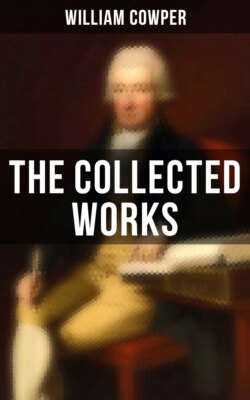Читать книгу The Collected Works - William Cowper - Страница 180
На сайте Литреса книга снята с продажи.
TO THE REV. JOHN NEWTON.
ОглавлениеTable of Contents
Olney, March 6, 1782.
Is peace the nearer because our patriots have resolved that it is desirable? Will the victory they have gained in the House of Commons be attended with any other? Do they expect the same success on other occasions, and, having once gained a majority, are they to be the majority for ever?[138] These are the questions we agitate by the fire-side in an evening, without being able to come to any certain conclusion, partly, I suppose, because the subject is in itself uncertain, and partly, because we are not furnished with the means of understanding it. I find the politics of times past more intelligible than those of the present. Time has thrown light upon what was obscure, and decided what was ambiguous. The characters of great men, which are always mysterious while they live, are ascertained by the faithful historian, and sooner or later receive the wages of fame or infamy, according to their true deserts. How have I seen sensible and learned men burn incense to the memory of Oliver Cromwell, ascribing to him, as the greatest hero in the world, the dignity of the British empire, during the interregnum. A century passed before that idol, which seemed to be of gold, was proved to be a wooden one. The fallacy, however, was at length detected, and the honour of that detection has fallen to the share of a woman. I do not know whether you have read Mrs. Macaulay's history of that period. She has handled him more roughly than the Scots did at the battle of Dunbar. He would have thought it little worth his while to have broken through all obligations divine and human, to have wept crocodile's tears, and wrapped himself up in the obscurity of speeches that nobody could understand, could he have foreseen that, in the ensuing century, a lady's scissors would clip his laurels close, and expose his naked villainy to the scorn of all posterity. This however has been accomplished, and so effectually, that I suppose it is not in the power of the most artificial management to make them grow again. Even the sagacious of mankind are blind, when Providence leaves them to be deluded; so blind, that a tyrant shall be mistaken for a true patriot: true patriots (such were the Long Parliament) shall be abhorred as tyrants, and almost a whole nation shall dream that they have the full enjoyment of liberty, for years after such a complete knave as Oliver shall have stolen it completely from them. I am indebted for all this show of historical knowledge to Mr. Bull, who has lent me five volumes of the work I mention. I was willing to display it while I have it; in a twelvemonth's time, I shall remember almost nothing of the matter.
W. C.
It has been the lot of Cromwell to be praised too little or too much. Of his political delinquencies, and gross hypocrisy, there can be only one opinion. But those who are conversant with that period well know how the genius of Mazarine, the minister of Louis XIII., was awed by the decision and boldness of Cromwell's character; that Spain and Holland experienced a signal humiliation, and that the victories of Admiral Blake at that crisis are among the most brilliant records of our naval fame. It was in allusion to these triumphs that Waller remarks, in his celebrated panegyric on the Lord Protector,
